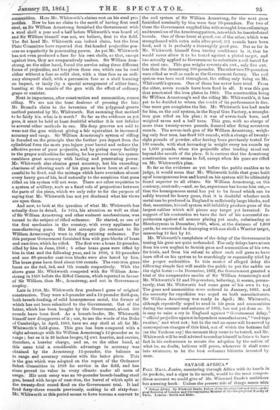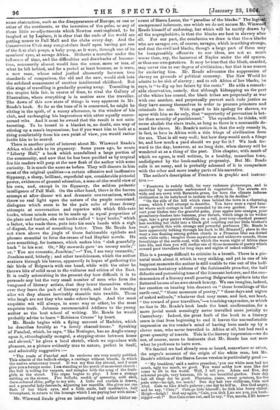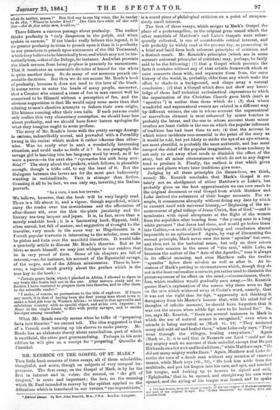SAVAGE AFRICA.* PALL MALL, Junior, sauntering through Africa with its
hands in its pockets, and a cigar in its mouth, would be the most compen- dious account we could give of Mr. Winwood Reade's ambitious but amusing book. Unless the present tide of things meets with
• Sabage Africa. By Winwood Reads, Fellow of the Geographical and Antbropolo• gical Societies of London. and Corresponding Member of the Oeogmphical S.)oiety of Paris. London: Smith and Elder.
some obstruction, such as the disappearance of Europe, or one or other of the continents, or the inversion of the poles, or any of those little re-adjustments which Newton contemplated, to be laughed at by Laplace, it is clear that the ends of the world are getting nearer to Pall Mall and the clubs every day. And the Conservative Club may congratulate itself upon having got one of the first club peeps, a baby peep, as it were, through one of its members' eyes, at savage Africa. Hitherto a traveller under the influence of time, and the difficulties and drawbacks of locomo- tion, necessarily almost would lose the sense, more or less, of what he left behind, and for a period at least become, as it were, a new man, whose mind jostled alternately between two standards of comparison, the old and the new, would sink into the subdued amazement of another intellectual childhood. But this stage of travelling is gradually passing away. Travelling in the tropics bids fair, in course of time, to rival the Gallery of Illustration, where everything is in motion save the traveller. The dawn of this new state of things is very apparent in Mr.
Reade's book. So far as the tone of it is concerned, he might be sitting in the spirit, of a sunny afternoon, in the window of his club, and exchanging his impressions with other equally uncon- cerned wits. And it must be owned that the result is not unin- teresting. To be tossed in a blanket is, no doubt, one way of stirring up a man's impressions; but if you want him to look at a thing comfortably from his own point of view, you would rather invite him to be seated.
There is another point of interest about Mr. Winwood Reade's Africa which adds to its piquancy. Some years ago, he wrote "Liberty Hall," a book which scandalized a large portion of the community, and now that he has been purified as by tropical fire his readers will peep at the new flesh of the author with some curiosity. It is much the same as before. They will discern in him most of the original qualities—a certain offensive and inoffensive flippancy, a sharp, brilliant, superficial eye, considerable pictorial power, evidences of general education, a man-of-the-world view of his own, and, except in its flippancy, the seldom pedantic intelligence of Pall Mall. On the other hand, there is the barren attempt at after-dinner wit and dramatic conversations, which throw no real light upon the nature of the people concerned, dialogues which seem to be the pale echo of those dreary attempts at conversation and repartee with which fifth-rate hacks, whose minds seem to be made up in equal proportion of tin-plate and fustian, eke out books called " boys books," which a father, who reads them, puts into his son's hands with a sigh of disgust, for want of something better. Then Mr. Reads has not risen above the jingle of those fashionable epithets and phrases essential to form the cream of bad Mayfair novels. He sees something, for instance, which makes him " sink gracefully back " in his seat. Or, "My stewards gave an uneasy smile;" or, " You are romantic, Joachim;"—" Yes, I am very romantic," Joachim said, bitterly ; and other tawdrinesses, which the author scatters through his leaves, apparently in hopes of gathering the fair birds of Belgravia with one hand, while with the other he throws bits of solid meat to the vultures and critics of the East. It is really astonishing in the present day how difficult it is to persuade any but the very small number of men who form the vanguard of literary artists, that they lower themselves when- ever they leave the path of literary truth, and that in running after wit they almost inevitably stumble into twaddle. Those who laugh are not they who make others laugh. And the most exquisite wit will always, in some way or other, be the most exquisite truth. Johnsop recommended Addison to the young author as the best school of writing. Mr. Reads he would probably advise to learn " Robinson Crusoe" by heart.
Mr. Reads begins with a flying account of Madeira, which he describes forcibly as "a lovely charnel-house." Speaking of Funchal, which, he says, " like Boulogne, has an Anglo-stamp upon it, ethnologically mongrel, a stepping-stone between home and abroad," he gives a local sketch, which we reproduce with pleasure, as a picture evidently true to nature, perfect in itself, and admirably suggestive :—
" The roads of Funchal and its environs are very neatly pebbled. This admits of the bullock-sledge, a carriage without wheels, in which the native aristocracy travel It was my first day abroad, and I must give you a foreign scene. I am standing at the porch of an ancient church : the bell is tolling for vespers, and mingles with the song of the fruit- girls in the street. The organ begins to play. I hear a strange rattling on the stones. Two bullocks, models of symmetry, with sleek, fawn-coloured skins, gallop to my side. A little red curtain is drawn, and a graceful lady descends, adjusting her mantilla. She gives me one flash of her black eyes, and a little smile, half meditative, half triumphant, in return to the homage which I am paying her with min.."
Mr. Winwood Reade gives an interesting and rather bitter ac-
count of Sierra Leone, the "paradise of the blacks." The logi unexpressed inference, one which we do not accuse Mr. Winw Reade himself of endorsing, but which will be tacitly drawn by all the negrophobists, is that the blacks are best in slavery after all. For our part, the conclusion we draw is that those blacks who are savages nre, of course, savages, which is nothing strange, and that the civil' zed blacks, though a large part of them may- be inexpressibly offensive to our ideas, are not so much worse than, say, the lazzaroui of Naples under the old system,
or than our own garotters. It may be true that the black, unaided, may never rise to our degree of civilization ; but that is no reason for enslaving him. Mr. Reade advocates the suppression of slavery on grounds of political economy. The New World he admits to be sick of slavery ; and to rob Africa of her blacks, lie
says, is " to dig up her future by the roots." He adds a remark- able observation, namely, that although kidnapping on the part of the whites has ceased, the black tribes are perpetually at war with one another, and perpetually pervert such rude justice as they have among themselves in order to procure prisoners and criminals for sale. With regard to his apology for slavers, we agree with him so far only, that "superiority of prevention is bet- ter than severity of punishment." The squadron, he thinks, will never abolish the slave trade, so long as there is a mercantile de- mand for slaves. Mr. Reade's notion is, that the only remedy is in fact, to hem in Africa with a thin fringe of civilization from the sea. That is all very well; but how deep would such a fringe be, and how much a yard should we pay for it? We look for- ward to the day, however, at no long date, when slavery will be wondered at as a thing of the past. This chapter, with much of which we agree, is well written, in a healthy, masculine tone, undisfigured by the book-makine. propensity. But Mr. Reads calls it an essay, and is probably ashamed of it in comparison with the other and more trashy parts of his narrative.
The author's description of Freetown is graphic and instruc- tive :-
"Freetown is rudely built, its very rudeness picturesque, and is encircled by mountains embosomed in vegetation. The streets are wide and are sown with Bermuda grass, for here the climate induces civilization in its babyhood to imitate the effete in its decline."
"On the side of the hill which rises behind the town is a charming scene, which I will attempt to describe. You have seen a rural ham- let where each cottage is half concealed by its own garden'. Now con- vert your linden into the graceful palm, your apples into oranges, your gooseberry-bushes into bananas, your thrush, which sings in its wicker cage, into a grey parrot whistling on a rail, your rosy-cheeked peasant lass suckling her child into a black girl combing out her little brother's wool ; sprinkle this with strange and powerful perfumes [Mr. Reade is here apparently talking through his book to Mr. Rimmel) ; place in the west a sun flaming among golden clouds in a Prussian blue sea dotted with white sails ; imagine those mysterious and unknown sounds, those breathings of the earth-soul, with which the warm night of Africa rises into life, and then you will realize one of those moments of poetry which reward poor travellers for long days and nights of naked solitude."
This is a passage difficult to criticize in a breath. There is a pic- torial truth about it which is very striking, and yet in one of his happiest moments the author is still unable to rise out of the half- unctuous hortatory address of the fashionable preacher, the half didactic and patronizing tone of the itinerant lecturer, and the con- descension of a literary swell pouring Belgravian epithets into the fluttered bosom of an awe-struck beauty. We can imagine, indeed, her emotion on hearing him descant on " those breathings of the earth-soul," "those moments of poetry," " those days and nights of naked solitude," whatever that may mean, and last, not least, " the reward of poor travellers,"—a touching expression, to which no line in Mr. Reade's book lends the least confirmation, for a more jovial monk seemingly never travelled more jovially to Canterbury. Indeed, the great fault of the book in a literary sense is that from beginning to end it leaves the uncomfortable impression on the reader's mind of having been made up by a clever man, who never travelled in Africa at all, but had read a great quantity of travels. This is the literary impression—we do not, of course, mean to insinuate that Mr. Reads has not seen what he professes to have seen.
We fancied we had already seen or heard, somewhere or other, the negro's account of the origin of the white man, but Mr. Reade's edition of the Sierra Leone version is particularly good :—
" ' My breddren,' said a native preacher, you see white man bad too much, ugly too much, no good. You want sabby how man like dat come to lib in the world. Well, I tell you. Adam and Eve, dey coloured people, very hansum, lib in one beautiful garden. Dere dey hab all tinge dat be good. Plantains, yams, sweet potatoes, foo-foo palm wine—he-igh, too much ! Den dey hab two childrum, Cain and Abel. Cain no like Abel's palaver ; one day he kill'm. Den God angry, and he say, "Cain!" Cain go hide himself ; he fink him berry claber. Heigh—heigh ! God say again, "Cain, you tink Lno see you, you bash- nigger—eh 7" Den Cain come out, and he say, "Yes, masse, I lib here- what de matter, muss ?" Den God say in one big voice, like de tender in de sky, " Where'm broder Abel ?" Den Cain turn white all ober with fear—dat de, first white man, brmkiren.'"
There follows a curious passage about profanity. The author thinks profanity is "only dangerous in the pulpit, and when
spoken in earnest." If the blacks really believe this legend, it is no greater profanity in them to preach upon it than it is profanity in our preachers to preach upon statements of the Old Testament, which they believe to be historically true, and which may not be his- torically true,—that of the Deluge, for instance. And what prevents the black sermon from being profane is precisely its earnestness.
That it inculcates an unamiable doctrine of hatred for the white is quite another thing. So do many of our sermons preach un- amiable doctrines. But then we do not accuse Mr. Reade's book of profanity, because it does not tend to the love of the black.
It seems never to enter the beads of many people, moreover, that a Creator who created a sense of fun in man cannot well be conceived to be Himself without a perception of fun, and the obvious supposition is that He would enjoy none more than that relating to men's abortive attempts to fathom their own origin, like kittens running after their own tails. If such persons could only realize this very elementary conception, we should bear less about profanity, and we should have fewer barren apologies for what they imagine ought to seem profane.
The story of Mr. Reade's loves with the pretty savage Ananga is carious, indescribably unreal, and pervaded with a Piccadilly twang in the recital which makes it rather irksome than other- wise. Was he really ever in such a wonderfully interesting situation, and could make so little of it ? In one paragraph the savage girl is teaching him her language word by word, as if he were a parrot—in the next she "reproaches him with being arti- ficial!" The story about the pockets, which follows, is plausible enough, though a trifle odd, to say the least of it. But the dialogues between the lovers are for the most part ludicrously wanting in verisimilitude. Fact is stranger than fiction. Granting it all to be fact, we can only say, inverting the Italian
proverb,
"Se h vero, h non ben trovato."
We believe, however, that the book will be very largely read. There is a life about it, and a vigour, though superficial, which carry the reader over the townishness and the affectation of after-dinner wit, over the thin tin-plate jocularity and the literary tea-tray lacquer and japan. It is, in fact, more than a merely readable book ; it is a fascinating book, flippant, bold, often unreal, but full of matter, and suggestive of thought to the traveller, very much in the same way as Hegelianism in a French popular travestie is interesting to the scholar, even while he pishes and frets over the manifold distortion. It would take a quarterly article to discuss Mr. Reade's theories. But as he hints as much himself, we may just whisper to our readers that he is very proud of them. Some of his chapters are full of interest,--as, for instance, his account of the Equatorial savage, of the negro, and of the African missionaries. There is, how- ever, a roguish mock gravity about the preface which is the true key to the book : —
" Certain grave facts, which I plucked in Africa, I allowed to ripen in my brain like fruits laid out in the sun. After mature study and re- flection I have ventured to prepare them into theories, and to offer them to the scientific reader."
"I make, of course, no pretensions to the title of explorer. If I have any merit, it is that of having been the first young man about town to make a bond fide tour in Western Africa ; to travel in that agreeable and salubrious country with no special object, and at his own expense ; to flaner in the virgin forest, to flirt with pretty savages, and to smoke his cigar among cannibals."
What Mr. Reade exactly means when he talks of "preparing facts into theories " we cannot tell. The idea suggested is that of a French cook turning up his sleeves to make pastry. Mr.
Reade has an elaborate theory about cannibalism, part of which is sacrificial, the other part gourmandising. Perhaps in his next edition be will give us a receipt for " preparing " Quenelles de
Cannibal.




































 Previous page
Previous page